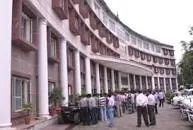Festival woes

Friday, 10 September 2021 | Pioneer
Rather than a robust, unified response, the States are dealing with the issue haphazardly
The festival season kicks off with Ganesh Puja on Friday and by September end, the country will know if it has managed to avoid the third wave of the Coronavirus pandemic. Big metropolises Delhi and Mumbai have taken precautions to see that the 10-day festival does not become a super-spreader. Public celebrations and gatherings are banned. People have been advised to celebrate the festival indoors. Delhi has said no to installing idols at public places and public idol immersion is also not allowed. The people better prefer eco-friendly idols that can dissolve in a tub of water. In Mumbai, however, the Ganapati Mandals have been asked to provide online darshan facilities through social media and cable channels. Idols not higher than four feet can be installed but no more than 10 people at one go are permitted to be around it. One hopes they are all fully vaccinated. For immersion in the sea, only a small group can accompany each idol. Most States have issued their own guidelines, keeping in mind the various traditions followed there. The Centre, along with the Indian Council of Medical Research and National Centre for Disease Control, has called for following safety protocols in view of fears of fresh COVID-19 cases peaking around October. The worst-case scenario envisaged is that the Ganesh and Dussehra festivals — 10-day affairs each — may turn into super-spreaders if public celebrations are not banned. And Diwali and Chhath — two major public events — are due only in November.
LocalCircles, a community social media platform, conducted a survey that reveals that 80 per cent Indian households will have service providers, helps, extended family and friends visit them in the next 30 days. Nearly 60 per cent plan to undertake visits in the next one month while 48 per cent plan to attend get-togethers on account of festivals and special occasions. Why cannot there be a national festival restriction guideline when for all practical purposes the pandemic is considered a national emergency? It is true that India is a democratic federal entity and health is a State subject but virulent viruses do not stand for constitutional formalities. A pandemic such as the highly mutating Coronavirus needs a rapid and unitary response across the nation. The Union and the States should have by now realised the rigidity of the dual federal system where health is an exclusive State subject. And it is not helping the national cause against the pandemic at all. For instance, Andhra Pradesh has restricted public celebrations of all festivals and even deferred mass events like the YSR Achievement Award function and Teachers’ Day celebrations. In stark contrast, neighbouring Telangana has allowed Ganapati celebrations on a grand scale, subject to following COVID-19 norms. There are no restrictions on the height of idols and immersion processions are allowed, for which massive arrangements are being made. How is it a case of equitable health and safety when one State prioritises people’s interests and another does not?





